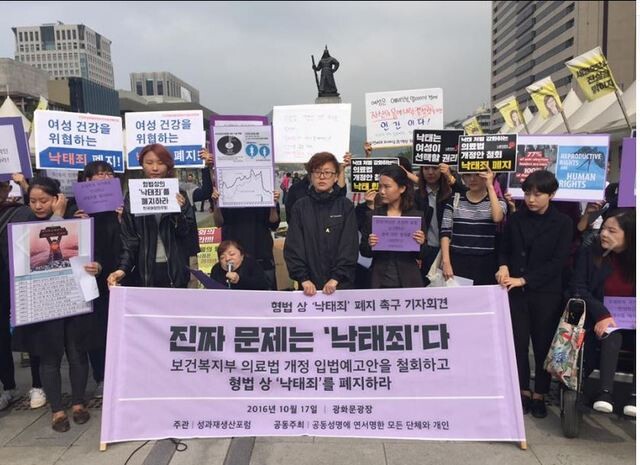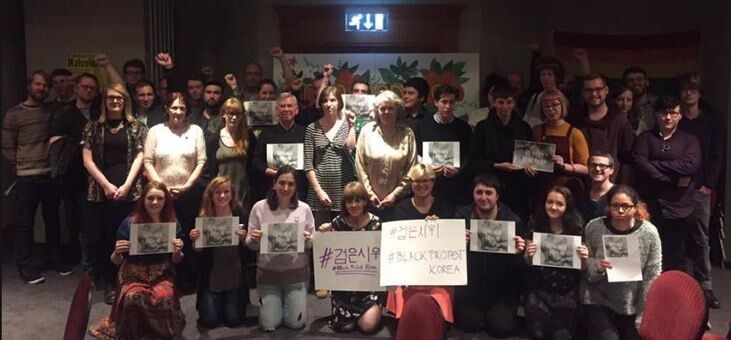hankyoreh
Links to other country sites 다른 나라 사이트 링크
S. Korea’s “black protest” movement gaining momentum for abortion rights

Gwanghwamun Square in central Seoul was the setting for a press conference at 11 am on Oct. 17 where members of the Sexuality and Reproduction Forum - a group of individual researchers and members of groups like Women with Disabilities Empathy, Korean Lawyers for Public Interest and Human Rights, Health and Alternative Gender Health Team, and the Network for Glocal Activist - called for the overturning of the government’s legislative announcement and the decriminalization of abortion. The event, organized by women’s rights, disabled persons’ rights, legal, medical, and civic groups and academics, saw the declaration of a campaign to decriminalize abortion, with signatures from 2,085 people as of Oct. 15. It was the first time women‘s rights groups were joined by representatives of other areas of society in a united call to decriminalize abortion.
Adopting the slogan “The real problem is the criminalization of abortion,” the forum declared, “It is the state and society that promote abortion, not women. The clear demand of decriminalization is that we shouldn’t place all responsibility for life on women, but should trust in women’s choices.”
“Women aren’t wombs. They are people before they are mothers,” the forum said, adding that it would “continue to fight for the health, safety, and lives of women who have been pushed outside the law’s framework.”
The forum also said the “fundamental problem” was “a reality where pregnancy termination is a crime,” arguing that “the contradiction between the law and reality will continue as long as abortion exists as a crime.”
It went on to issue calls for the state to “systematically improve sexual equality and sex education and guarantee that all women have access to the contraceptive technology and healthcare facilities they need.”
“Every year, 200,000 women go on the operating table for pregnancy terminations,” said Yun Jeong-won, an obstetrician/gynecologist who took part in the press conference. “Are these women immoral? The safest method of pregnancy termination available is the use of drugs, and there are even safer methods that have been use for over 20 years, yet they haven’t been introduced in South Korea because abortion is illegal here. The immoral ones are the state.”
The roughly 170,000 pregnancy terminations that take place in South Korea each year are performed by administering general anesthesia to women and using vacuum suction to remove the fetus. The argument from Yun and others is that the state is forcing women into a more dangerous option despite the existence of safer ones.
Gangnam Station Exit 10 (named after the murder of a young women there in May), Fire Femi Action, Femi Dangdang, and various other women‘s rights groups plan to unite in a demonstration on Oct. 30 to take action toward decriminalization of abortion.
“This campaign to decriminalize abortion has the ultimate goal of ensuring the right for everyone to practice their own sexuality and motherhood, regardless of marital status, sexual orientation, disabilities, illnesses, or economic differences,” said Sexuality and Reproduction Forum researcher Lee Yu-rim in a telephone interview with the Hankyoreh.
On Oct. 12, feminist groups held a press conference in front of the Central Government Complex in Seoul to demand the withdrawal of the government legislative announcement for measures pronouncing abortion an “immoral treatment act” and stiffening punishments against doctors who perform pregnancy terminations. On Oct. 15, hundreds of people dressed in black held a rally in front of Bosingak belfry in Seoul’s Jongno district to demand decriminalization of abortion.

Irish Socialist Party: “Solidarity with struggle for decriminalization of abortion in South Korea”
Amid this movement, ROSA, a feminist group associated with the Socialist Party in Ireland, sent a message of support on Oct. 16 for the decriminalization struggle in South Korea. On its Facebook page, the group posted a picture showing a poster from the Oct. 15 Bosingak “protest in black” bearing the words “My womb is mine,” along with supporters holding up signs bearing the hashtag “#BlackProtest” in Korean.
“We send our solidarity to women in South Korea protesting for abortion rights and against an attempt to criminalise doctors who perform surgical abortions,” the post read.
ROSA is an acronym for Reproductive rights, against Oppression, Sexism & Austerity, named after Rosa Luxemburg and Rosa Parks. Luxemburg was a Marxist theorist, philosopher, economist, anti-war activist, and revolutionary socialist of Polish-Jewish descent who became a naturalized German citizen, and is considered one of the top minds of the earliest 20th century before her death at the hands of German right-wingers. Rosa Parks has been called the mother of the modern civil rights movement for her role an activist for racial equality in the US.
Around the world, the abortion issue is becoming increasingly personalized - indicating a growing trend of state respect for women‘s right to self-determination. Germany and France permit legal abortions through the 12th week of pregnancy, Sweden through the 18th. In Japan and the United Kingdom, abortions are allowed for socioeconomic reasons. In contrast, heavily Catholic countries like Ireland and some in Central and South America strictly prohibit abortion except in cases where the mother’s health is in serious jeopardy. Poland recently announced a bill banning all abortions, but the plan was dropped after tens of thousands of women took to the streets in protest. In June, the US Supreme Court ruled a state-level abortion ban in Texas unconstitutional.
Government “re-examining” plan after doctors threaten “full-scale halt” to abortions
On Sep. 22, the Ministry of Health and Welfare issued a legislative announcement on administrative rules for healthcare that would punish doctors with suspensions of up to one year for performing pregnancy terminations. After the Korean Association of Obstetricians and Gynecologists (KAOG) announced plans for a “full-scale halt” on abortion procedures in response, Minister Chung Chin-youb signaled a slight retreat on Oct. 14, saying he had “ordered a re-examination.”
The KAOG has stuck to its plan for a halt, announcing at its fall conference on Oct. 16 that it “cannot accept the inclusion of artificial pregnancy termination as an immoral treatment act in disregard of social reality.”
“If government policies are transformed into a means of imposing sacrifices on obstetricians and gynecologists, we will do everything in our power to stop that,” the association added.
“Pregnancy termination is permitted up to a certain week of pregnancy in most advanced countries, and Japan even allows it on socioeconomic grounds,” it continued. “The notion of achieving medical ethics through ethical coercion that ignores the reality is armchair administration.”
By Seok Jin-hee, staff reporter
Please direct questions or comments to [english@hani.co.kr]

Editorial・opinion
![[Column] Season 2 of special prosecutor probe may be coming to Korea soon [Column] Season 2 of special prosecutor probe may be coming to Korea soon](https://flexible.img.hani.co.kr/flexible/normal/500/300/imgdb/original/2024/0426/3317141030699447.jpg) [Column] Season 2 of special prosecutor probe may be coming to Korea soon
[Column] Season 2 of special prosecutor probe may be coming to Korea soon![[Column] Park Geun-hye déjà vu in Yoon Suk-yeol [Column] Park Geun-hye déjà vu in Yoon Suk-yeol](https://flexible.img.hani.co.kr/flexible/normal/500/300/imgdb/original/2024/0424/651713945113788.jpg) [Column] Park Geun-hye déjà vu in Yoon Suk-yeol
[Column] Park Geun-hye déjà vu in Yoon Suk-yeol- [Editorial] New weight of N. Korea’s nuclear threats makes dialogue all the more urgent
- [Guest essay] The real reason Korea’s new right wants to dub Rhee a founding father
- [Column] ‘Choson’: Is it time we start referring to N. Korea in its own terms?
- [Editorial] Japan’s rewriting of history with Korea has gone too far
- [Column] The president’s questionable capacity for dialogue
- [Column] Are chaebol firms just pizza pies for families to divvy up as they please?
- [Column] Has Korea, too, crossed the Rubicon on China?
- [Correspondent’s column] In Japan’s alliance with US, echoes of its past alliances with UK
Most viewed articles
- 1[Column] Season 2 of special prosecutor probe may be coming to Korea soon
- 2‘We must say no’: Seoul defense chief on Korean, USFK involvement in hypothetical Taiwan crisis
- 3No good, very bad game for Korea puts it out of Olympics for first time since 1988
- 4Division commander ordered troops to enter raging flood waters before Marine died, survivor says
- 5Is Japan about to snatch control of Line messenger from Korea’s Naver?
- 6Korea’s 1.3% growth in Q1 signals ‘textbook’ return to growth, says government
- 7Is N. Korea threatening to test nukes in response to possible new US-led sanctions body?
- 8[Editorial] Korea’s surprise Q1 growth requires objective assessment, not blind fanfare
- 9[Editorial] New weight of N. Korea’s nuclear threats makes dialogue all the more urgent
- 10‘Weddingflation’ breaks the bank for Korean couples-to-be